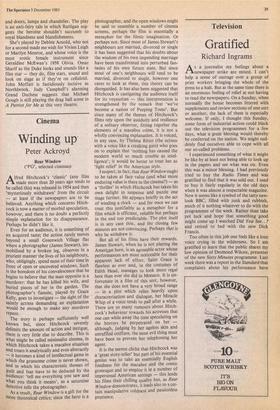Cinema
Winding up.
Peter Ackroyd
Rear Window ('PG', selected cinemas)
Alfred Hitchcock's 'classic' (any film made more than 20 years ago tends to be called this) was released in 1954 and then 'mysteriously withdrawn' from the circuit
— at least if the newspapers are to be believed. Anything which concerns Hitch- cock is now a matter of morbid speculation, however, and there is no doubt a perfectly simple explanation for its disappearance. Perhaps he didn't like it.
Even for an audience, it is something of an acquired taste; the action rarely moves beyond a small Greenwich Village flat where a photographer (James Stewart), im- mobilised by a broken leg, observes in a prurient manner the lives of his neighbours, who, obligingly, spend most of their time in front of open or uncovered windows. Such is the boredom of his convalescence that he begins to believe that the man opposite is a murderer: that he has killed his wife, and buried pieces of her in the garden. The Photographer's fiancée, played by Grace Kelly, goes to investigate — the sight of the saintly actress demanding an explanation would be enough to make any murderer repent.
The story is perhaps sufficiently well known but, since Hitchcock severely delimits the amount of action and intrigue, there is very little else to describe. This is what might be called minimalist cinema, in which Hitchcock takes a macabre situation and treats it analytically and even abstractly — it becomes a kind of intellectual game in Which the gruesome crime is never shown, and in which his characteristic themes of guilt and fear have to be deduced by the audience: 'tell me everything you saw and What you think it means', as a saturnine detective tells the photographer. As a result, Rear Window is a gift for the More theoretical critics; since the hero is a photographer, and the open windows might be said to resemble a number of cinema screens, perhaps the film is essentially a metaphor for the filmic imagination. Or perhaps not. Since most of James Stewart's neighbours are married, divorced or single it has been suggested that his doubts about the wisdom of his own impending marriage have been transformed into perturbed fan- tasies of his own future state. But since most of one's neighbours will tend to be married, divorced or single, however one cares to look at them, this theory can be disregarded. It has also been suggested that Hitchcock is castigating the audience itself
for its voyeurism — this interpretation is strengthened by the remark that 'we've become a nation of Peeping Toms'. But
since many of the themes of Hitchcock's films rely upon the assiduity and resilience of a solitary observer, fitting together the elements of a macabre crime, it is not a wholly convincing explanation. It is voiced, in any case, by Thelma Ritter (the actress with a voice like a creaking gate) who goes on to explain that 'nothing has caused the modern world so much trouble as intel- ligence'; it would be better to treat her as 'light relief' in the American style.
I suspect, in fact, that Rear Window ough t to be taken at face value (and what more enduring value is there in the cinema?) — as a 'thriller' in which Hitchcock has taken his own delight in suspense and puzzle one stage further. He appears briefly in the act of winding a. clock — and for once we can treat this justifiably as a metaphor for a film which is efficient, reliable but perhaps in the end too predictable. The plot itself is in any case thin, and the closing few minutes are not convincing. Perhaps that is why he withdrew it.
But all of his films have their rewards. James Stewart, when he is not playing the American hero, is an agreeable actor whose performances are most noticeable for their apparent lack of effort. Saint Grace is flawless as ever and, in the costumes of Edith Head, manages to look more regal here than ever she did in Monaco. It is un- fortunate in a film of this sort, however, that she does not have a very broad range in a plot which relies heavily upon characterisation and dialogue, her Miracle Whip of a voice tends to pall after a while. There are so many rumours about Hitch- cock's behaviour towards his actresses that one can while away the time speculating on the horrors he perpetrated on her although, judging by her ageless skin and unruffled coiffure, the most evil thing must have been to prevent her telephoning her agent. It is the merest cliche that Hitchcock was a 'great story-teller' but part of his essential genius was to take an essentially English fondness for the macabre and the comic grotesque and to employ it in a number of impersonal American settings — this lends his films their chilling quality but, as Rear Window demonstrates, it leads also to a cer- tain manipulative coldness and passionless prurience.














































 Previous page
Previous page